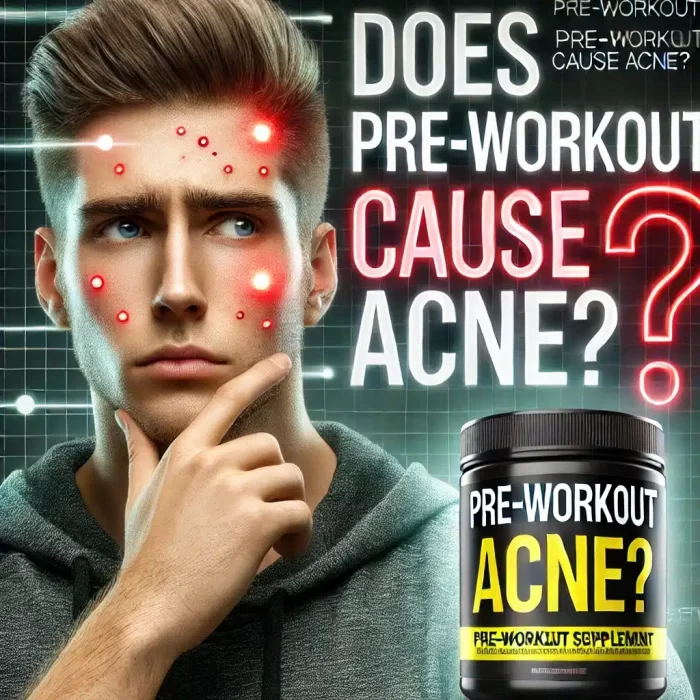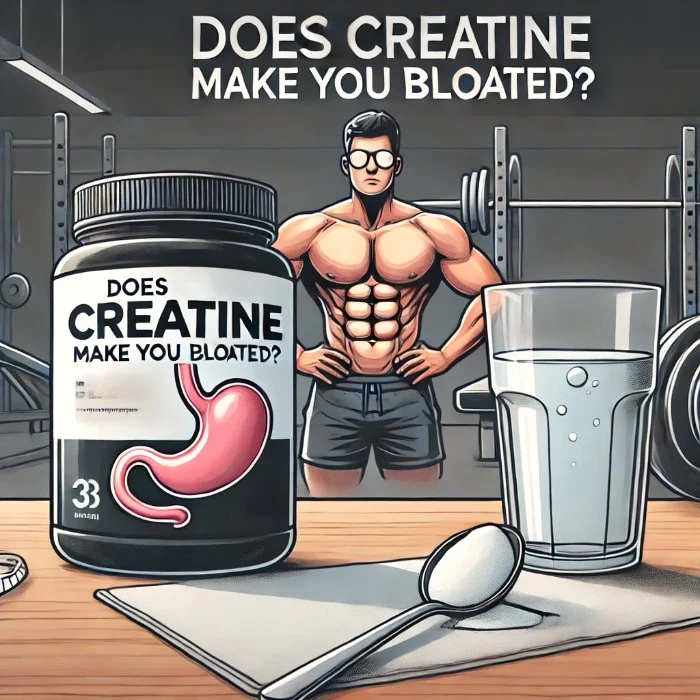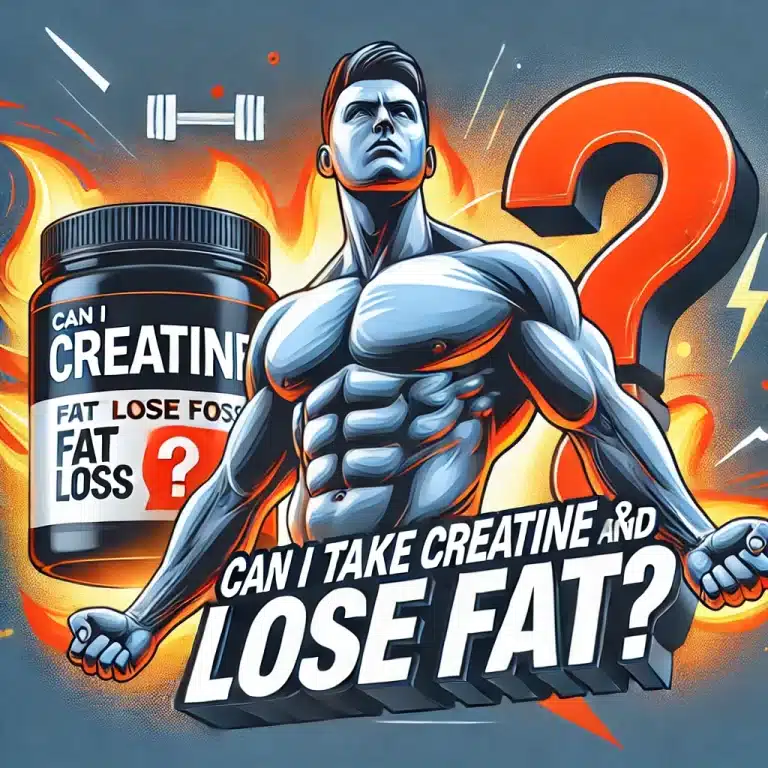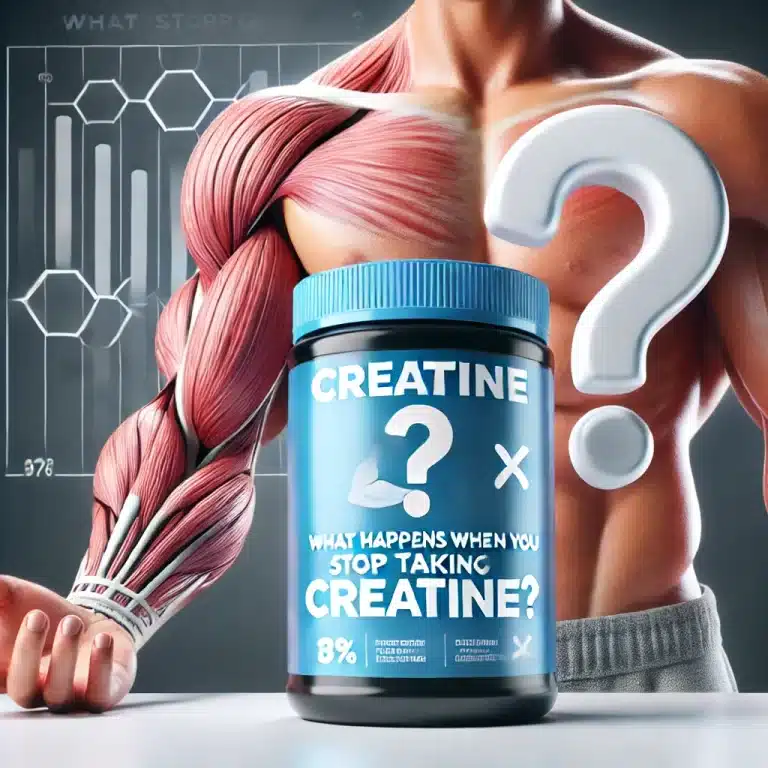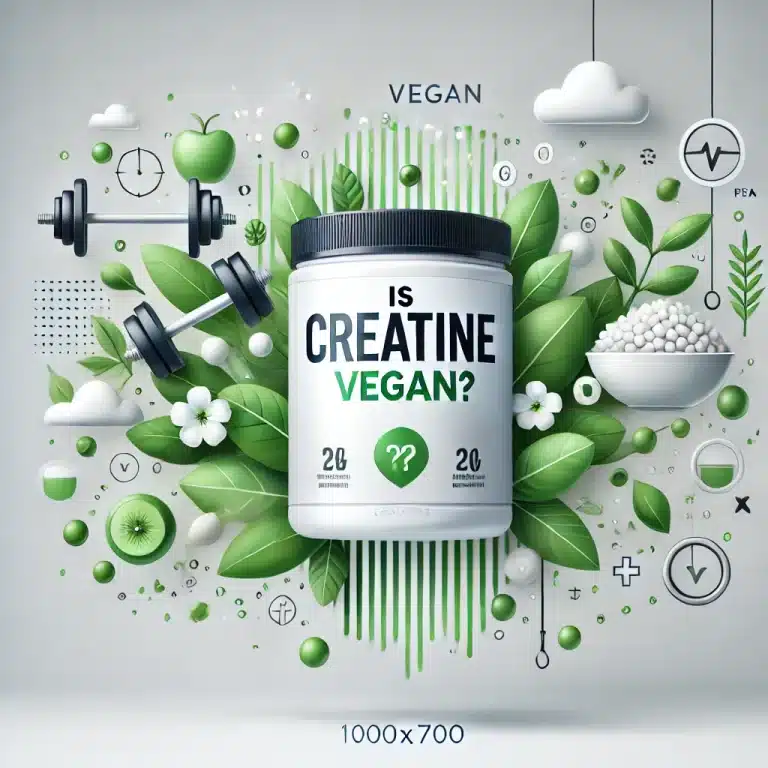Does Pre-workout Cause Acne?
If you’ve ever taken a pre-workout supplement and noticed breakouts, you’re not alone. Many people wonder, “Does pre-workout cause acne?” As someone who has studied nutrition and supplements, and experienced this firsthand, I wanted to dive deep into this topic to separate fact from myth.
The connection between supplements, hormones, and skin health isn’t always straightforward. While pre-workout itself doesn’t directly cause acne, some ingredients in it may trigger breakouts in certain individuals. So let’s break it down: why does this happen, who is at risk, and what can you do to prevent it?
What’s in Pre-Workout That Might Trigger Acne?
Pre-workout supplements are designed to boost energy, focus, and endurance, but some of their Pre-workout supplements are designed to enhance energy, focus, and endurance, but some of the key ingredients in these formulas can negatively impact skin health in certain individuals causing itching and more. While pre-workout itself doesn’t directly cause acne, specific compounds may trigger breakouts by influencing hormone levels, increasing oil production, or causing inflammation.
Below are the most common pre-workout ingredients that may be responsible for acne flare-ups.
1. Caffeine and Increased Oil Production
Caffeine is one of the primary ingredients in most pre-workouts due to its ability to boost alertness, improve endurance, and delay fatigue. However, caffeine can also have a direct impact on hormones and skin health, especially in individuals prone to acne.
How Caffeine Might Trigger Acne:
✔ Increases Cortisol Levels – Caffeine stimulates the adrenal glands to release cortisol (the stress hormone). Elevated cortisol can lead to higher oil (sebum) production, which clogs pores and contributes to breakouts.
✔ Dehydrates the Skin – Caffeine is a diuretic, meaning it increases fluid loss through urination. Dehydrated skin can overcompensate by producing excess oil, leading to more clogged pores and acne.
✔ Triggers Inflammation – If caffeine causes excess stress on the body, it may lead to increased systemic inflammation, which can exacerbate acne flare-ups.
Who Is Most at Risk?
- Individuals with naturally oily skin
- Those with high cortisol levels or chronic stress
- People with hormonal acne, particularly around the jawline and chin
What You Can Do:
- Reduce your pre-workout dosage or switch to a lower-caffeine version.
- Drink plenty of water before and after taking pre-workout to prevent dehydration-related oil production.
- Avoid taking pre-workout on an empty stomach, as this can increase cortisol spikes.
2. Artificial Sweeteners and Skin Irritation
Many pre-workout supplements contain artificial sweeteners such as:
- Sucralose
- Aspartame
- Acesulfame potassium (Ace-K)
- Sugar alcohols (erythritol, sorbitol, xylitol)
While these sweeteners make pre-workouts taste better, they may also contribute to digestive and inflammatory issues, which can indirectly trigger acne.
How Artificial Sweeteners Might Trigger Acne:
✔ Disrupt Gut Health – Studies suggest that artificial sweeteners alter gut bacteria, which may contribute to systemic inflammation and skin problems.
✔ Spike Insulin Levels – Some artificial sweeteners can trick the body into releasing insulin, which may trigger hormonal fluctuations that increase sebum production.
✔ Cause Skin Sensitivities – Some individuals are sensitive to artificial additives, leading to skin irritation, redness, and inflammation.
Who Is Most at Risk?
- Those with gut health issues, such as bloating or IBS
- Individuals prone to hormonal acne or insulin resistance
- People who consume multiple artificially sweetened products daily
What You Can Do:
- Switch to a naturally sweetened pre-workout that uses stevia or monk fruit instead of artificial sweeteners.
- Monitor your gut health, if you experience bloating, gas, or skin breakouts after consuming pre-workout, artificial sweeteners may be a trigger.
- Reduce the frequency of sweetened supplements to see if your skin improves.
3. B Vitamins (B6 & B12) and Hormonal Imbalance
B vitamins, particularly B6 and B12, are included in many pre-workouts to support energy metabolism and muscle recovery. However, high doses of these vitamins have been linked to hormonal acne, especially in people who already have acne-prone skin.
How B Vitamins Might Trigger Acne:
✔ Excess B12 Alters Skin Bacteria – Research suggests that too much vitamin B12 can influence Propionibacterium acnes, the bacteria responsible for acne, making it more likely to trigger breakouts.
✔ B6 May Cause Inflammation – Some studies indicate that high doses of vitamin B6 can cause skin inflammation, leading to acne on the jawline, chin, and forehead.
✔ Not Always Necessary – If you already get enough B vitamins from your diet, taking extra through pre-workout may exacerbate acne-prone skin.
Who Is Most at Risk?
- Individuals with pre-existing acne conditions
- People who take multivitamins or eat B-vitamin-rich diets (meat, eggs, dairy)
- Those with sensitive skin or inflammation-prone skin
What You Can Do:
- Check the B-vitamin content in your pre-workout, some formulas contain excessive amounts beyond daily requirements.
- If you suspect B vitamins are an issue, try a pre-workout without added B6 or B12.
- Maintain a balanced diet so you’re not overloading on B vitamins through supplements.
4. Creatine and Hormonal Effects
Creatine is a well-researched supplement known for enhancing strength and endurance, but some people worry it might contribute to acne.
How Creatine Might Trigger Acne:
✔ May Increase DHT (Dihydrotestosterone) – Some studies suggest creatine slightly increases DHT, a hormone that is linked to excess sebum production and clogged pores.
✔ Causes Water Retention and Sweating – Creatine draws water into muscle cells, which can lead to increased sweat production. More sweat can trap bacteria and debris on the skin, contributing to acne.
✔ Not a Direct Cause – While creatine does not cause acne, individuals who are genetically predisposed to DHT-related breakouts may notice flare-ups.
Who Is Most at Risk?
- Individuals with hormonal acne (DHT-sensitive skin)
- People who sweat excessively during workouts and don’t wash their skin afterward
- Those who experience breakouts from other DHT-related triggers (such as testosterone supplements)
- Also, this can affect the Weiner size.
What You Can Do:
- Stay hydrated to minimize excessive water retention and sweating.
- Wash your face and body after workouts to prevent bacteria buildup.
- If you suspect DHT-related acne, try reducing creatine intake and monitor any changes in your skin.
5. High Sugar Content and Insulin Spikes
Some pre-workout supplements contain added sugars, maltodextrin, or dextrose, which can spike insulin levels and contribute to hormonal imbalances.
How High Sugar Content Might Trigger Acne:
✔ Causes Blood Sugar Spikes – High glycemic index ingredients can increase insulin levels, which may lead to higher sebum production and clogged pores.
✔ Triggers Inflammation – Diets high in processed sugars and refined carbs are linked to systemic inflammation, which may worsen acne.
✔ Affects Hormonal Balance – Insulin spikes can increase androgen activity, which may stimulate oil production and acne formation.
Who Is Most at Risk?
- Individuals with sugar-related acne sensitivity
- Those with insulin resistance or PCOS
- People who consume high-carb diets alongside pre-workout
What You Can Do:
- Choose low-sugar or sugar-free pre-workouts to minimize insulin fluctuations.
- Pair pre-workout with a protein-rich meal to prevent blood sugar crashes.
- Monitor whether removing high-carb pre-workouts improves your skin over time.
By understanding how different pre-workout ingredients affect hormones, oil production, and inflammation, you can identify potential acne triggers and make informed choices about your supplementation.
Who Is Most Likely to Experience Acne from Pre-Workout?
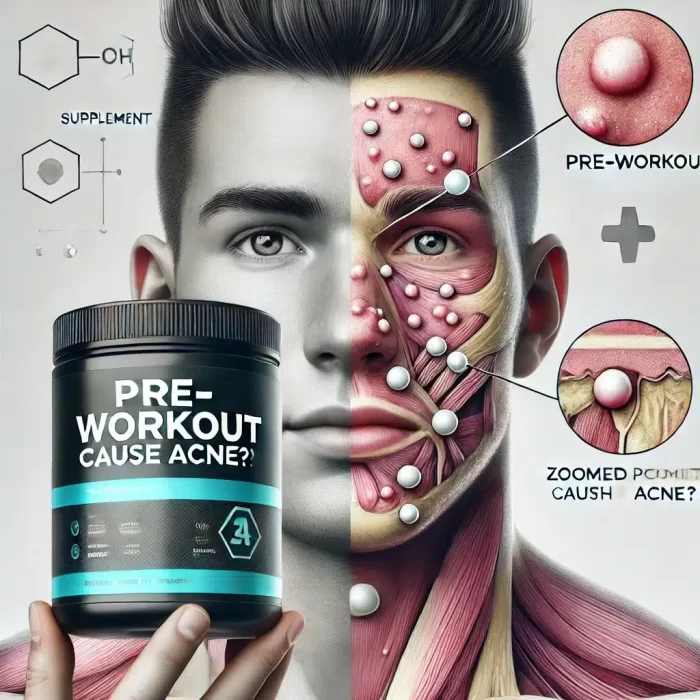
Not everyone who takes pre-workout will develop acne, but certain individuals may be more prone to breakouts due to hormonal sensitivity, skin type, lifestyle habits, and overall health status. While pre-workout supplements contain ingredients that may impact sebum production, inflammation, and gut health, how a person reacts to them depends on their physiology.
Here are the groups most likely to experience acne from pre-workout and why they might be affected.
1. Individuals with Naturally Oily or Acne-Prone Skin
People who already have oily skin tend to produce more sebum, which can lead to clogged pores and breakouts. Since some ingredients in pre-workout, such as caffeine and B vitamins, can increase oil production, individuals with naturally oily skin may experience worsening acne when using these supplements.
- Why? Caffeine stimulates cortisol, which in turn triggers sebaceous glands to produce more oil. B vitamins, particularly B6 and B12, can also increase sebum production and inflammation.
- What to Watch For: Increased breakouts, particularly on the forehead, nose, and chin, which are areas where sebaceous glands are more active.
- How to Reduce Risk: Use oil-free skincare products, wash your face after workouts, and choose pre-workouts without excessive caffeine or high-dose B vitamins.
2. Individuals with Hormonal Acne
Hormonal acne is often triggered by fluctuations in testosterone, cortisol, insulin, and DHT (dihydrotestosterone) all of which can be influenced by certain pre-workout ingredients.
- Why? Some pre-workout supplements contain creatine and high doses of caffeine, which may increase DHT levels or spike cortisol, leading to more sebum production.
- What to Watch For: Acne along the jawline, chin, and lower cheeks, which are common areas for hormonal breakouts.
- How to Reduce Risk: Choose a low-caffeine pre-workout, limit high-DHT stimulants like creatine, and support hormonal balance with a nutrient-rich diet and proper hydration.
3. People Who Sweat Heavily and Don’t Cleanse Properly Post-Workout
Sweating is a natural way for the body to regulate temperature and eliminate toxins, but if sweat sits on the skin for too long, it can trap dirt, bacteria, and dead skin cells, leading to exercise-induced acne.
- Why? When pre-workout increases body temperature and sweat production, it can also increase the likelihood of clogged pores, particularly if sweat mixes with gym bacteria, oils, or cosmetic products.
- What to Watch For: Breakouts on the forehead, back (bacne), shoulders, and chest, which are common sweat-prone areas.
- How to Reduce Risk: Wash your face and body immediately after working out, use a gentle, non-comedogenic cleanser, and wear moisture-wicking clothing to reduce trapped sweat.
4. Individuals with Gut Health Issues or Food Sensitivities
Emerging research suggests that gut health and skin health are closely linked, meaning that digestive imbalances can trigger systemic inflammation and lead to acne. Since some artificial sweeteners and sugar alcohols in pre-workout can disrupt gut bacteria, people with digestive sensitivities may experience acne breakouts as a result.
- Why? Ingredients like sucralose, aspartame, sorbitol, and maltodextrin may alter gut microbiome balance, leading to increased inflammation and acne flare-ups.
- What to Watch For: Skin irritation, bloating, gas, and breakouts that flare up after consuming pre-workout.
- How to Reduce Risk: Choose pre-workouts without artificial sweeteners, incorporate probiotic-rich foods, and focus on a fiber-rich, anti-inflammatory diet.
5. Individuals with Insulin Resistance or Blood Sugar Sensitivity
Some pre-workout supplements contain added sugars, maltodextrin, or dextrose, which can spike insulin levels and lead to hormonal imbalances that increase sebum production.
- Why? Elevated insulin levels can stimulate androgen activity, leading to excess oil production and clogged pores.
- What to Watch For: Acne on the lower face and jawline, which is often associated with high insulin levels and hormonal imbalances.
- How to Reduce Risk: Opt for low-sugar or sugar-free pre-workouts, pair pre-workout with a protein-rich meal, and monitor blood sugar levels if prone to insulin sensitivity.
6. Individuals with stress levels or Poor Sleep Habits
Cortisol, the stress hormone, is a major player in acne development, and pre-workout can elevate cortisol levels, especially if taken in high doses or too late in the day.
- Why? High cortisol levels can increase inflammation, stimulate oil production, and weaken the skin barrier, making breakouts more likely.
- What to Watch For: Increased acne after stressful periods, poor sleep, or excessive caffeine consumption.
- How to Reduce Risk: Take pre-workout earlier in the day, practice stress management techniques, and ensure at least 7-9 hours of quality sleep per night.
7. Those Who Overuse Pre-Workout or Take High Doses
Taking too much pre-workout or relying on it every single workout may increase the likelihood of experiencing side effects, including acne.
- Why? Overuse of pre-workout leads to chronic cortisol elevation, overstimulation of sebaceous glands, and increased dependence on stimulants.
- What to Watch For: More frequent breakouts, dehydration, and fatigue, indicating overuse of stimulants.
- How to Reduce Risk: Cycle pre-workout by taking breaks every few weeks, use it only on high-intensity workout days, and choose lower-stimulant formulas when possible.
How to Prevent Acne from Pre-Workout?
If you suspect that your pre-workout is causing breakouts, the good news is that there are several ways to reduce the likelihood of acne while still benefiting from your supplement. Acne triggered by pre-workout is usually linked to hormonal fluctuations, increased oil production, dehydration, or inflammation, all of which can be managed with the right strategies.
Below are key steps you can take to minimize acne while continuing to boost your energy and workout performance with pre-workout supplements.
1. Choose a Clean Pre-Workout Formula
Not all pre-workouts are the same, and some contain high doses of caffeine, artificial sweeteners, or other ingredients that may contribute to acne flare-ups. If you are prone to breakouts, selecting a cleaner, skin-friendly formula can make a big difference.
How to Choose the Right Pre-Workout:
- Opt for Low-Caffeine or Caffeine-Free Options – High caffeine intake can trigger cortisol spikes, increasing oil production and breakouts. Choosing a moderate-dose or caffeine-free pre-workout may reduce skin-related side effects.
- Avoid Artificial Sweeteners – Many pre-workouts contain sucralose, aspartame, and sugar alcohols, which can disrupt gut health and increase inflammation. Instead, look for naturally sweetened pre-workouts with stevia or monk fruit.
- Check B-Vitamin Content – Some pre-workouts contain high doses of B6 and B12, which have been linked to hormonal acne in some individuals. If you already get enough B vitamins from your diet, consider a pre-workout without excessive B6 or B12.
- Avoid High-Sugar Formulas – Added sugars and insulin-spiking ingredients like maltodextrin and dextrose can contribute to hormonal imbalances and acne. Choosing a low-carb or sugar-free pre-workout may help regulate insulin levels and prevent breakouts.
By carefully selecting your pre-workout formula, you can reduce the likelihood of acne triggers while still getting the performance benefits of supplementation.
2. Stay Hydrated and Support Skin Health
Dehydration is a major factor in acne development, and pre-workout supplements, especially those containing caffeine or creatine can contribute to fluid loss. When the skin loses moisture, it compensates by producing more oil, which can clog pores and lead to breakouts.
How to Stay Hydrated:
- Drink at least 8-10 glasses of water per day, and increase intake on days when using pre-workout.
- Pair pre-workout with electrolytes, especially if you sweat heavily during workouts.
- Eat hydrating foods like cucumbers, watermelon, and leafy greens to maintain skin hydration.
- Avoid excessive caffeine intake, as it can increase water loss and dry out the skin.
Additionally, supporting skin health from the inside out can help prevent acne. Incorporate:
- Zinc supplements or zinc-rich foods (oysters, pumpkin seeds, chickpeas) to regulate oil production.
- Omega-3 fatty acids (salmon, flaxseeds, walnuts) to reduce inflammation.
- Vitamin A (sweet potatoes, carrots, spinach) to promote healthy skin cell turnover.
Hydration and proper nutrition play a key role in preventing breakouts and ensuring that pre-workout ingredients do not negatively impact your skin.
3. Maintain Good Post-Workout Hygiene
Sweat, bacteria, and pre-workout residue can build up on your skin during intense training sessions, leading to exercise-induced breakouts. Proper post-workout hygiene is essential to prevent clogged pores and bacterial growth.
How to Keep Skin Clean After Workouts:
- Wash your face immediately after exercising using a gentle, non-comedogenic cleanser.
- Use a salicylic acid or benzoyl peroxide cleanser if you are prone to breakouts, as these help unclog pores and kill acne-causing bacteria.
- Avoid touching your face during workouts, as gym equipment can harbor bacteria that may contribute to acne.
- Change into fresh workout clothes after exercising to prevent body acne (bacne).
- Use an oil-free, non-comedogenic moisturizer to restore hydration after cleansing.
Keeping your skin clean and free of sweat buildup can significantly reduce pre-workout-related breakouts.
4. Test Your Response to Different Pre-Workouts
If you are experiencing acne and suspect that pre-workout is a trigger, consider eliminating it for a short period to see if your skin improves. This can help identify which ingredients are causing breakouts and allow you to make a more informed choice.
How to Test Your Pre-Workout Sensitivity:
- Eliminate pre-workout for two weeks and monitor any changes in your skin.
- Reintroduce a clean, low-stimulant pre-workout and observe how your skin reacts.
- Keep a journal of symptoms, noting any changes in skin health, digestion, or energy levels.
- Try different brands to see if some formulas work better for your skin than others.
By paying attention to how your body responds, you can make adjustments that help you avoid acne flare-ups while still benefiting from pre-workout supplementation.
5. Address Hormonal Imbalances and Internal Health
Since many pre-workout ingredients affect hormone levels, balancing hormones through lifestyle, diet, and supplementation can help prevent breakouts caused by pre-workout supplements.
How to Balance Hormones Naturally:
- Limit stress and manage cortisol levels through meditation, deep breathing, or yoga.
- Avoid excessive stimulant use, including pre-workout and energy drinks, which can spike cortisol.
- Prioritize sleep, aiming for at least 7-9 hours per night to regulate hormone production.
- Eat a balanced diet with plenty of fiber, healthy fats, and lean proteins to support stable insulin levels.
Addressing internal health factors ensures that pre-workout ingredients don’t amplify existing hormonal imbalances that contribute to acne.
Final Thoughts: Does Pre-Workout Cause Acne?
While pre-workout does not directly cause acne, certain ingredients like caffeine, artificial sweeteners, high-dose B vitamins, and creatine may trigger breakouts in sensitive individuals.
The best way to determine if pre-workout is affecting your skin is to monitor your body’s response and choose a formula with clean ingredients that support both performance and skin health.
By making a few simple adjustments, you can continue using pre-workout while keeping your skin clear and healthy.
